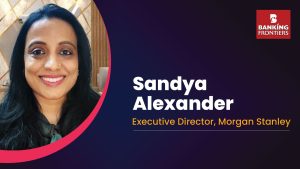Sandya Alexander, Executive Director at Morgan Stanley reveals her perspectives on the journey of women empowerment and her own experiences:

Manoj Agrawal: When did you determine the course of your life?
Sandya Alexander: I wanted to be a doctor when I was in school. Later, when I graduated with Industrial Relations and a major in economics, I wanted to pursue HR as HR was oft-discussed during the course. However, I started my career as a retail banker and transitioned to investment banking and then to asset management. However, my actual journey began with HSBC, where I realized I was a good people manager and a leader. I also started taking an active interest in diversity and inclusion.
For the last 10 years, I have headed the operations department for various organizations. Apart from operations and related efficiencies, I made a conscious effort to focus on the real essence of diversity that enables one to thrive in an inclusive environment.
Don’t you think numbers are an enabler for the ultimate objective?
Yeah, numbers are one way to drive accountability but should not precede merit. The key is inclusion, breaking the bias. As Gen Z enters the workforce, I see a shift in attitude and acceptance toward a culturally diverse workforce even among 3 generations who are a part of the same team. I observe the change in attitude. Gen Z is more inclusive and more acceptive of diversity.
Has Gen Z reached a stage where women don’t have to take a decision between a career and a family?
I think Gen Z is not looking at marriage as a culmination of all things. They are very clear about their aspirations – they are not hesitant to leave the workforce and start-out on their own. That is positive. It is better than sacrificing their aspirations or goals for some personal commitments.
Gen Z also has a tech advantage and is utilizing its potential to the fullest, including preserving eggs to combat the biological clock cliche.
I think it’s a personal choice. When I was at that stage, there was immense pressure of the biological clock ticking away. Today, the focus is more on mental and physical wellbeing. The biological clock is no longer a limitation. Plus, there are options that are enabling people to prioritize their careers and not take a setback. During interactions over the years, women who returned to work after a break, said that they felt dissuaded as their peers had progressed in their respective careers, and they had to skip those opportunities.
Covid drove the WFH culture in a big way. How did it impact the working woman?
In the cultural context, expectations from women to follow the traditional route still exist in India, Southeast Asia and South Asia. I’ve heard of instances where women were unable to manage both responsibilities and quit their jobs during the pandemic.
When we compare the West with Southeast Asia or South Asia, there is a clear difference in the way a couple co-partners in all responsibilities from equal parenting to co-partnering in household roles. The shift is happening in the Asian region as well. The new reality is that double income is required to meet high expenses and lead a better life. Like the West, double income is becoming the new normal in Asia.
Let’s drill deeper. Are the younger women working more for money or because they are ambitious?
I am very ambitious, and I’ve moved jobs over the last few years. The monetary factor comes by default. I get restless very fast and look for new challenges that motivate me to unlearn the old and learn new things.
Having invested 18 years in the financial services industry, I jumped to shipping shared services, a completely new industry segment. Plus, this was a small company, and gave me tremendous opportunity to grow, explore and build everything from scratch. It was a major step in moving away from my comfort zone and wading into unchartered waters. But I did really well and still have great relationships with some of my co-workers.
Interestingly, I wore a new hat during covid, as I joined Morgan Stanley in a very senior position. I had to shed the inhibitions of working with a new corporate and shoulder new responsibilities in a virtual environment. But I was excited to wear multiple hats. And in the last one year, I have started enjoying the whole process of taking the risk and venturing into spaces I had never entered.
If a job becomes too predictable and boring, you want a change. Are more women opting for such opportunities?
Today, the ratio of women who want to switch to a new job and accept new challenges has risen to 50:50 against 80:20 in the past. I not only work in a very senior position for a bank, but also work late nights. Similarly, many women are ready to work late hours. The surge in women entrepreneurs who have moved out of corporate careers to explore different, unconventional arenas is rising. Women are getting restless and are not afraid to realize their ambitions, just as their male counterparts.
What is your message to women who quit work, want to return, but are hesitant?
Many corporates are creating opportunities for women and men (back from a career break) who want to return to work. Women wanting to return to the workforce should take inspiration from those women who have actually progressed after the break. That is because they carry a desire and a fire in their bellies that they have a point to prove and many milestones to cross.
At the same time, I understand their need to be with their children, and give them their best. But eventually, kids grow up, and they leave a void. The feeling that everybody has a life, and I am stuck, sinks in. When I had kids, I was very clear that I would be available for them but would never give up my career because I didn’t want my life to revolve only around them.
What are the top 3 advice that you would like to share with women?
Women need to put themselves as a priority. That doesn’t mean you’re discounting others in the equation. The second point is setting realistic expectations. Many women set sky-high expectations – they should be best at work and at home. They need to learn to rationalize their priorities and list their needs on the basis of what they want to do instead of what needs to be done. The third point involves unlearning and relearning. We work with a diverse group and learn a lot from each other. A lot of things we’ve learned may not necessarily be the ultimate truth. Accepting that is very important.
What is the key to a seamless learning experience?
Conversations! It is important to have conversations around all subjects ranging from the need to shift focus areas, to discuss priorities and to develop a collective goal. Do not limit the scope of conversations to only colleagues at the workplace. Involve your family while setting expectations and state clearly what you can and cannot do.
I think unlearning is also important, especially our biases. To cite a personal example, one of the top executive search firm in Mumbai repeatedly asked me whether I had a family and if I was willing to relocate to Mumbai and comfortable migrating to a new city. I counter questioned whether they would pose the same question to a male candidate. It’s not that women are not looking at opportunities, but most often, corporates do not have women-friendly policies.
People are also resistant to use technology and related changes. Instead of thinking about 100 ways technology can help us, they are thinking of 100 ways to resist it. They are unwilling to unlearn and want to continue operating in an old-fashioned way.
If you look at the startup space, it is dominated by young people who are sowing seeds just based on an idea they want to explore. Most of them are not even looking at risks or wondering a million times whether the idea will work or not.
Any role models?
Yes. I like Elon Musk. I am fascinated with his thought process; his ideologies are very different. His tenacity is amazing, and he’s never stopped learning. These virtues are required in today’s world, where we have just crossed a pandemic. Steve Jobs is yet another person I like. His story is inspiring. He was disoriented at one point in his life and came to Haridwar for direction. That’s perfectly normal. We all have those moments. The key is how do you find a purpose and switch back? That’s what you take from each of these role models.
The role model could be male or female. If you like something about a person, pick up his attributes and use them to build your persona. But do not blindly emulate someone.







